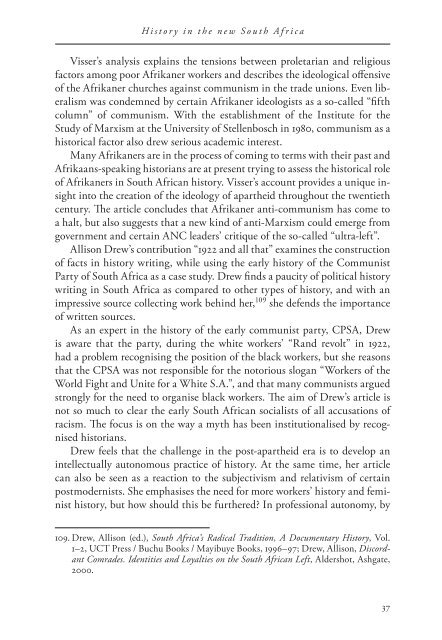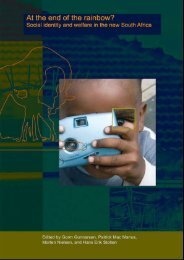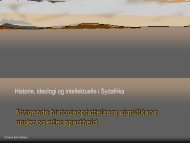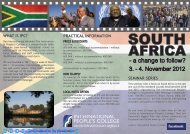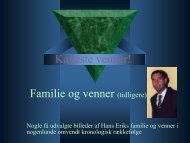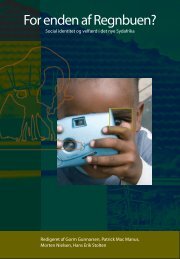History Making and Present Day Politics - Stolten's African Studies ...
History Making and Present Day Politics - Stolten's African Studies ...
History Making and Present Day Politics - Stolten's African Studies ...
Create successful ePaper yourself
Turn your PDF publications into a flip-book with our unique Google optimized e-Paper software.
H i s t o r y i n t h e n e w S o u t h A f r i c a<br />
Visser’s analysis explains the tensions between proletarian <strong>and</strong> religious<br />
factors among poor Afrikaner workers <strong>and</strong> describes the ideological offensive<br />
of the Afrikaner churches against communism in the trade unions. Even liberalism<br />
was condemned by certain Afrikaner ideologists as a so-called “fifth<br />
column” of communism. With the establishment of the Institute for the<br />
Study of Marxism at the University of Stellenbosch in 1980, communism as a<br />
historical factor also drew serious academic interest.<br />
Many Afrikaners are in the process of coming to terms with their past <strong>and</strong><br />
Afrikaans-speaking historians are at present trying to assess the historical role<br />
of Afrikaners in South <strong>African</strong> history. Visser’s account provides a unique insight<br />
into the creation of the ideology of apartheid throughout the twentieth<br />
century. The article concludes that Afrikaner anti-communism has come to<br />
a halt, but also suggests that a new kind of anti-Marxism could emerge from<br />
government <strong>and</strong> certain ANC leaders’ critique of the so-called “ultra-left”.<br />
Allison Drew’s contribution “1922 <strong>and</strong> all that” examines the construction<br />
of facts in history writing, while using the early history of the Communist<br />
Party of South Africa as a case study. Drew finds a paucity of political history<br />
writing in South Africa as compared to other types of history, <strong>and</strong> with an<br />
impressive source collecting work behind her, 109 she defends the importance<br />
of written sources.<br />
As an expert in the history of the early communist party, CPSA, Drew<br />
is aware that the party, during the white workers’ “R<strong>and</strong> revolt” in 1922,<br />
had a problem recognising the position of the black workers, but she reasons<br />
that the CPSA was not responsible for the notorious slogan “Workers of the<br />
World Fight <strong>and</strong> Unite for a White S.A.”, <strong>and</strong> that many communists argued<br />
strongly for the need to organise black workers. The aim of Drew’s article is<br />
not so much to clear the early South <strong>African</strong> socialists of all accusations of<br />
racism. The focus is on the way a myth has been institutionalised by recognised<br />
historians.<br />
Drew feels that the challenge in the post-apartheid era is to develop an<br />
intellectually autonomous practice of history. At the same time, her article<br />
can also be seen as a reaction to the subjectivism <strong>and</strong> relativism of certain<br />
postmodernists. She emphasises the need for more workers’ history <strong>and</strong> feminist<br />
history, but how should this be furthered? In professional autonomy, by<br />
109. Drew, Allison (ed.), South Africa’s Radical Tradition, A Documentary <strong>History</strong>, Vol.<br />
1–2, UCT Press / Buchu Books / Mayibuye Books, 1996–97; Drew, Allison, Discordant<br />
Comrades. Identities <strong>and</strong> Loyalties on the South <strong>African</strong> Left, Aldershot, Ashgate,<br />
2000.<br />
37


